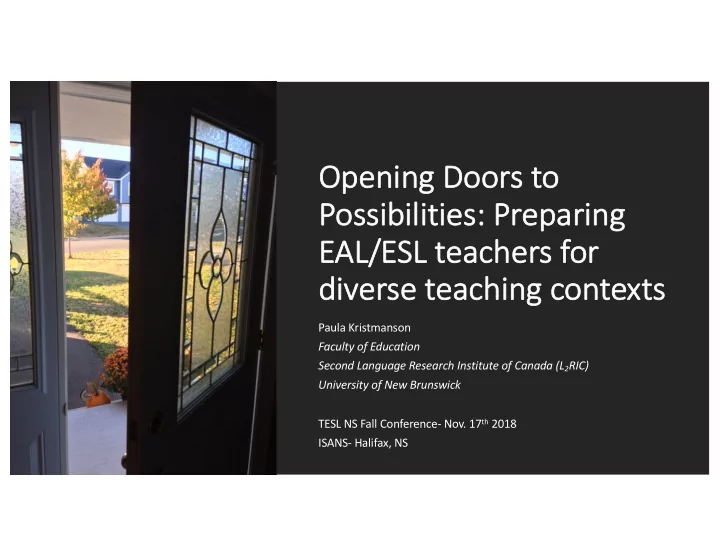

Op Opening Do Doors to Po Possibilities: Preparing EA EAL/ES ESL teachers for di diver erse e tea eachi ching ng contexts Paula Kristmanson Faculty of Education Second Language Research Institute of Canada (L 2 RIC) University of New Brunswick TESL NS Fall Conference- Nov. 17 th 2018 ISANS- Halifax, NS
Presentation Outline A bit about me- Context, Beliefs, Experiences Components of “Good” Teacher Education (TESL) The Role of the Field Experience/ Practicum Role of On-going Professional Learning Conclusions and reflections
My Context University of New Brunswick Fredericton Faculty of Education L 2 RIC
Fr From my own Experiences and Insights as a Le Learner and a Teacher Language learning is challenging Goals evolve and change Teachers are always learners Experiences shape our beliefs
3 C’s 3 H’s Caring Humility Communication Humanity Competence Humour Ev Evolving Core Beliefs
Wh What are the Eleme ments of “Good” TESL teacher education? Voic ices from Lit iterature and Learners
Ch Characteristics of of a “good ood” language TESL te teacher education program Syllabi Literature Student Standards Voices TESL- Initial Teacher Preparation
TESOL 6 Principles (2017)
Cr Creating “Con Condition ons” for or la language le learnin ing “It is important to stress that projecting enthusiasm does not mean pep talks, theatrical performances or tears in our eyes when we utter the words Shakespeare or past conditional.” (Dörnyei, 2007, p. 33)
DM DMC’s Directed Motivational Currents Integrates aspects of… Flow Engagement Aspiration Action “DMC is not merely a pathway toward a goal… it not only provides direction for action, but it energizes action.” (Dörnyei, Henry & Muir, 2016)
Fo Former Student/Current Teacher voices “Culturally too, I try to keep in mind that understanding is helpful and judgment is not…One of the only things I’m firm about right now is respect. I try to model this both explicitly and implicitly in every interaction I have.” (Anne, 2018 UNB grad, working in Middle East) “Creating an atmosphere where the students feel comfortable to be themselves, make mistakes, ask questions, and be silly is the most important thing in a language-learner community. The stronger the relationship, the stronger the trust and respect will be.” (Emma, 2016 UNB grad, working in China)
“The key skill that beginning language Amelia, B.Ed/CTESL teachers need is the ability to take a Grad graduate concept and break it down… it’s not just 2012, currently about lesson planning… but how do you scaffold so that students can learn and working in access the learning… you need to be settlement creative and flexible… whether it is a language in Atlantic particular grammar point or a settlement- Canada relate task like ‘how to buy milk’… this is something we look for when we hire new LINC teachers.”
Th The Import rtance ce of th the Practi cticu cum (e.g., Cruikshank & Armaline, 1986; Collier, 1999; Darling Hammond, 2006; Lee, 2005; Loughran, 2002) Theory-Practice Link Deeper Widely Understanding Recognized of Complexities of the Classroom Importance
Research on International Internships (see also, Maynes et al., 2012; Pence & Macgillivray, 2008; Riches & Benson, 2013) Expanding Worldviews Leaving One’s Particular Comfort Experience Zone Importance
Cultural The Empathy for Experiences Language Language for Language Classroom Learners Teachers Our Recent Research related to International Internships – Key Themes
Theme 2: Empathy for Language Learners “Yeah similar to Tanya … but it was kind of funny when you would be in a restaurant and order something and then you might get something totally different. I think it’s just being open minded and kind of being open to that and … but it’s a good experience to be placed in that situation, especially if you’re going be a second language teacher, to realize how maybe difficult or frustrating it can be .” (Mark, 2015, Colombia)
Th Theme 2: Em Empathy for or La Langu guage e Lea Learner ers “I guess what goes through my mind is that I see ESL and international students from a whole different perspective . Now I know what it feels like to be the one not understanding what is going on, like for me to be the minority, like to have no idea … Most of the time your students in the class were speaking back and forth and you had no idea what was going on … I now see things like from a whole different perspective because… I know what it feels like to not understand and to not know what’s going on and to be frustrated. I feel like I can help them more, like I understand their frustrations. I will be more willing to take the time and go the extra mile to help them.” (Bonnie, 2013, China)
• PLC’s • Professional associations • Informal networks • Self-directed PL • Conferences and workshops Professional Learning
• “Informal PL like our car drives to and from TESL NB meetings and conferences give us time to talk, discuss and think about things in a different way… I also like sharing opportunities and a chance to observe other teachers... That shouldn’t just be for your practicum” (Corey, UNB CTESL/B.Ed. Grad, Professional Learning currently working as an EAL lead in NB)
“Make sure you find a supportive community for yourself with your coworkers” (Emma, graduate 2016) Professional Learning
Conclusions and Reflections
Recommend
More recommend